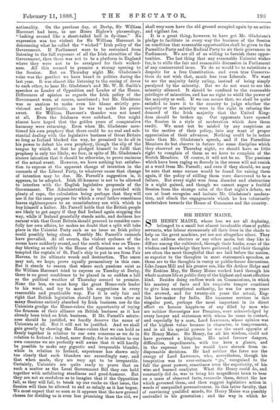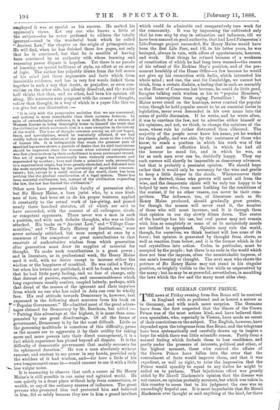SIR HENRY MAINE.
SLR HENRY MAINE, whose loss we are all deploring; belonged to a small but almost invaluable class of public servants, who labour strenuously all their lives in the shade to help on the great machine, yet are not altogether silent. They do not address electors or any other mobs, but they like to diffuse among the cultivated, through their books, some of the wisdom and knowledge they have gathered; and their thoughts are often the most thoughtful that are laid before the nation, as superior to the thoughts in most statesmen's speeches, as those are to the thoughts in vestry or public-house discussions. Like James Mill and his greater son, like Sir Arthur Helps and Sir Erskine May, Sir Henry Maine worked hard through his whole mature life at public duty of the highest and most effective kind. Besides doing endless work on Commissions, in which his mastery of facts and his exquisite temper combined to give him exceptional authority, he was for seven years the avowed, and for twenty-six years the actual, Eng- lish law-maker for India. His immense services in this singular post, perhaps the most important in its direct effect on human happiness of any filled by men who are neither Sovereigns nor Premiers, were acknowledged by every lawyer and statesman with whom he came in contact, and especially by a man, Lord Lawrence, whose opinion was
of the highest value because in character, in temperament, and in all his special powers he was the exact opposite of
Sir Henry Maine. Sir Henry, for all his wisdom, could not have governed a kingdom. His mind foresaw dangers, difficulties, impediments, with too keen a glance, and in the supreme hour he would have shrunk from in- dispensable decisions. He had neither the force nor the• energy of Lord Lawrence, who, nevertheless, though his temptation was to over-estimate "go," recognised to the
full the great powers, sometimes even the superiority, of his, wise and learned coadjutor. What Sir Henry could do, and, constantly did do, was to bring his magnificent brain to bear
on a mass of observed facts, reconcile them, detect the law
which governed them, and then suggest legislative action in words of unequalled persuasiveness. In this latter faculty, that
of convincing qualified minds, Sir Henry Maine was possibly unrivalled in his generation ; and the way in which he
employed it was as special as his success. He melted his opponent's views. Let any one who knows a little of the subject—for he never professed to address the totally ignorant—read in the wonderful book which he called "Ancient Law," the chapter on the origin of primogeniture. He will find, when he has finished those few pages, not only that he is convinced, but that he is sensible of having been convinced by an authority with whose learning and reasoning power dispute is hopeless. Yet there is no parade of learning, no special kailliance of style, no effort at an array of logic. The author has palpably drawn from the full stores of his mind just those arguments and facts which form irresistible evidence, and has in very few words linked them together in such a way that doubt, or prejudice, or even con- viction on the other side, has silently dissolved, and the reader half thinks that that, and no other, had been his opinion all along. His sentences were pregnant with the causes of thought, rather than thought, in a way of which in a paper like this we can give but one illustration :—
" It is only with the progressive societies that we are concerned, and nothing is more remarkable than their extreme fewness. In spite of overwhelming evidence, it is most difficult for a citizen of Western Europe to bring thoroughly home to himself the truth that the civilisation which surrounds him is a rare exception in the history of the world. The tone of thought common among us, all our hopes, fears, and speculations, would be materially affected, if we had vividly before us the relation of the progressive races to the totality of human life. It is indisputable that much the greatest part of 'mankind has never shown a particle of desire that its civil institutions should be improved since the moment when external completeness was first given to them by their embodiment in some permanent record. One set of usages has occasionally been violently overthrown and superseded by another ; here and there a primitive code, pretending to a supernatural origin, has been greatly extended, and distorted into the most surprising forms, by the perversity of sacerdotal commen- tators ; but, except in a small section of the world, there has been nothing like the gradual amelioration of a legal system. There has been material civilisation, but, instead of the civilisation expanding the law, the law has limited the civilisation."
Other men have possessed this faculty of persuasion also ; but Sir Henry Maine, a born jurist who, by a rare kind- ness of fate, had been set to do his proper business, applied it constantly to the actual work of law-giving, and passed nearly three hundred statutes, all of which are said to have succeeded, with the consent of all colleagues, rivals, or competent opponents. There never was a man in such a position, and with such definite thoughts, who was so little attacked. His books on "Ancient Law," and "Village Com- munities," and "The Early History of Institutions," were never seriously criticised, but were accepted at once by a oonsensus of the competent as great contributions to that reservoir of authoritative wisdom from which generation after generation must draw its supplies of material for thought. To make such contributions is a great power ; and in literature, as in professional work, Sir Henry Maine used it well, with no desire except to increase either the wisdom or the happiness of mankind. He was called a Tory ; but when his letters are published, it will be found, we believe, that he had little party feeling, and no fear of change, only that distrust of passion, emotion, and unreasonableness which long experience usually confers, coupled latterly, perhaps, with that dread of the masses of the ignorant and their impulses from which no one who has ruled in Asia can ever be wholly free. His real attitude towards Democracy is, however, best expressed in the following short sentence from his book on
r"Popular Government." He admitted most of the great advan- tages claimed for Democracy by Mr. Bentham, but added :— " Putting this advantage at the highest, it is more than com- pensated by one great disadvantage. Of all the forms of government, Democracy is by far the most difficult. Little as the governing multitude is conscious of this difficulty, prone as the masses are to aggravate it by their avidity for taking more and more powers into their direct management, it is a fact which experience has placed beyond all dispute. It is the difficulty of democratic government that mainly accounts for its ephemeral duration." He was a man absolutely without rancour, and content to see power in any hands, provided only the wielders of it had wisdom, and—for here a little of his own temperament came in—would consent to use it with a little
C-.. less vulgar noise. ,• It is reassuring to observe that such a career as Sir Henry Maine's is still possible in our noisy and agitated world. He rose quietly to a front place without help from connections, or wealth, or any of the ordinary sources of influence. The great persons who promoted him and protected him and believed in him, did so solely because they saw in him a grand intellect which could do admirable and comparatively rare work for the community. It was by impressing the cultivated only that he rose step by step in estimation and influence, till we have been assured on good authority, that had Lord Palmerston's Life-Peerage project succeeded, Sir Henry Maine would have been the first Life Peer, and till, in his latter years, he was besieged, always in vain, with offers of appointments, honours, and work. Most things he refused because of a weakness of constitution of which he had long been warned—the reason of his refusal of Sir Erskine May's position, and of the per- manent headship of the Home Office—a few because he would not give up his connection with India, which interested his whole mind ; and one, the seat for Cambridge, we cannot but think, from a certain disdain, a feeling that in such an assembly as the House of Commons has become, he could do little good. Imagine talking such wisdom as his to "popular Members," amidst interruptions from raging Parnellites ! Sir Henry Maine never stood on the hustings, never courted the popular voice, though he held popular assent to be an essential factor in legislation, never even descended in his own name into the arena of public discussion. If he wrote, and he wrote often, it was to convince the few, not to advertise either himself or his opinions, and not, we think, to change the opinions of the mass, whose rule he rather distrusted than abhorred. The majority of the people never knew his name, yet he worked for them gladly, and was able, by the assistance of those who knew, to reach a position in which his work was of the largest and most effective kind, in which he had all the honour he cared for, and in which he was, as far as such men ever can be, decidedly happy. They say such careers will shortly be impossible as democracy advances, but that is probably a pessimist opinion. We should hope rather that it would only be necessary for the wise and gentle to keep a little deeper in the shade. Whencesoever their power is derived, those who govern will need aid from the wise, and the democratic chiefs will be only too happy to be helped by men who, from mere loathing for the conditions of the contest, if for no other reason, can never be their com- petitors. The influence, too, of literature such as Sir Henry Maine produced, should gradually grow greater, for though the masses will never read it, the number of those who will must increase, and it is through them that opinion in our day slowly filters down. The orator of the hustings has his use, but real power may not remain with him so completely as some of us in melancholy moods are inclined to apprehend. Opinion may rule the world, though, for ourselves, we think instinct will lose none of its force ; but opinion is generated by thought from above, as well as emotion from below, and it is the former which in the end crystallises into action. Codes, in particular, must be accepted by the people ; but there is no code in the world which does not bear the impress, often the unmistakable impress, of one man's learning or thought. The next man who shows the potence of Sir Henry Maine may not stand in his singular position, so brightly visible to the few while so unperceived by the many ; but he may be as powerful, nevertheless, in moulding the laws which the few and the many must alike obey.



































 Previous page
Previous page